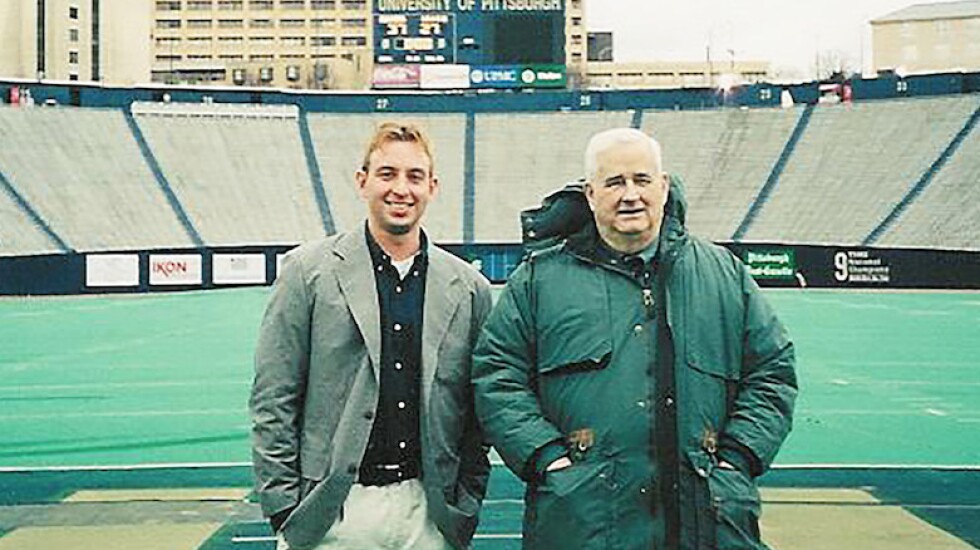
LAS VEGAS — Howard Cosell burst into Beano Cook’s Manhattan office, shook his head at the messy desk and coffee stains on Cook’s tie and unleashed the staccato speech pattern familiar to millions of TV viewers.
“You-my-friend, you are the human [bleep-ing] personification of an unmade bed!”
Knowing Cosell’s manner, Cook took no offense. He also had come to learn that Cosell truly was erudite.
“But, unfortunately, he thinks we want to hear it all.”
That’s in Cook’s entertaining “Haven’t They Suffered Enough?” (White Valley Press), penned by the talented author-historian John D. Lukacs and published last fall.
Cook worked behind the scenes at Pitt, for the Steelers and Dolphins, at ABC and CBS Sports and ESPN, yapping about his true love, college football.
Betting was in his blood. All you really need in life, he wrote, is a good doctor, a good barber and a good bookie.
Chris Andrews and Jimmy Vaccaro, both of the South Point sportsbook, and bettor-media ace Dave Sharapan, all western Pennsylvania natives, confirm that Cook was a beloved Pittsburgher.
“One of the best,” Sharapan says. Says Andrews, “Loved Beano.”
Lukacs, another Pittsburgh native, tapped Cook for advice before studying at Notre Dame nearly 30 years ago.
“The first non-coach, non-jock, non-traditional commentator to talk college football on the tube,” Lukacs wrote. “A real-life Oscar Madison in a world of vanilla former players, coaches and journalism-school grads.
“A genuine pioneer. He was truly colorful long before television was.”
A BEANO SNOWBALL
In 1984, a U.S. Supreme Court ruling fueled the explosion of college football across the television landscape. Actually, establishes Lukacs, that lift-off occurred in ’82.
“That was the first year of the split-network TV package,” Lukacs tells me, “that Beano came up with in 1977 and helped negotiate in 1981.”
More than 50 years ago, Cook hatched a 16-team playoff plan, involving 11 conference victors and five independents. “Sometime in the near future,” he wrote, “college football will catch up to me, or at least to where I was in 1971.”
As ABC president Roone Arledge’s lieutenant, Cook helped arrange the first nationally televised prime-time game, Alabama-Miami, in 1968, and the epic Texas-Arkansas “Game of the Century” in ’69.
He was in the hotel conference room, near O’Hare International Airport, when NCAA dictator Walter Byers blew his lid negotiating with the calm Arledge.
All show, Arledge told Cook of Byers’ bluster, a passing phase to get to the important stuff.
On ABC in 1983, Cook trumpeted underdog Penn State beating West Virginia outright. The Nittany Lions won 41-23.
Ten years later, Cook made the biggest bet of his life, on a Florida State-Notre Dame game that he helped cover for ESPN’s first “College GameDay.” The Irish plus seven, he told his bookie, for $25,000. Notre Dame won 31-24.
“Never pick against Notre Dame when it’s getting points at home. It’s like picking against Russia when it’s fighting on its home soil in the middle of winter.”
He knew sports betting would be legalized in the States. Six years after his death, SCOTUS quashed a federal bill to allow states to pursue their own sports-wagering fates. States without legal sports betting are now in the minority.
“The driving force behind television is the ratings game, and what drives ratings? Betting.”
New York Giants founder Tim Mara was a bookmaker, adds Cook, and Art Rooney Sr. bought the Steelers, in 1933, with horse-track winnings.
As long as you gamble for fun, Rooney advised Cook, as a form of entertainment, you’re OK. Once you bet the rent, you’re in trouble. The only time to double up is when you win. “And never chase.”
Once again, college football soon will dominate, morning to midnight, glorious fall Saturdays.
“It’s easy to see that Beano Cook, in so many words,” Lukacs said, “was the guy responsible for packing the proverbial snowball and rolling it down the hill into this modern avalanche.”
A WELL-TOLD STORY
Lukacs served as Cook’s bellhop, chauffer, researcher and ghost writer. Cook would peruse a draft of a paper and send Lukacs bonus checks with a note, “[Bleeping] amazing. You’re worth every penny.”
Doesn’t matter where you go to college or what you study, Cook first told Lukacs many years ago, just write. “Become a storyteller, then a great storyteller.”
Don’t just read the sports pages, either. Explore authors and historians, like Thomas Wolfe, Willie Morris and William Manchester. Lukacs, 45, owes the expansion of his intellectual horizons, and reading with a purpose, to Cook.
So it’s no coincidence that Lukacs’ maiden tome — “Escape from Davao,” a commercial and critical success published in May 2011 — features a daring American breaking from a World War II Japanese prison.
Lukacs, at that point, promised Cook he’d complete his book. At 81, Cook died in October 2012.
When ESPN barely recognized Cook in its 150th anniversary celebration of college football, an irate Lukacs found the motivation to spend two full years finishing “Suffered.”
Lukacs organized “a mountain” of haphazard files and folders which Cook, a lifetime bachelor, had begun compiling in the mid-1970s. Lukacs captures his subject’s uncensored and unapologetic voice, and Runyonesque lifestyle.
Moreover, Lukacs straightens Beano’s bed a bit, hospital-corner sheets, and cleans his tie.
“An incredible life story,” Lukacs said, “that will be understood by both college football fans and future generations.”






